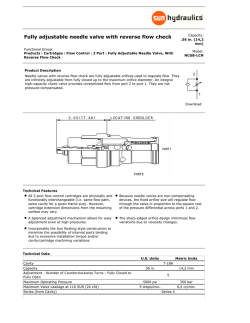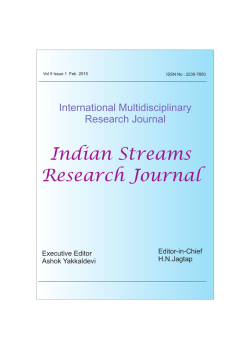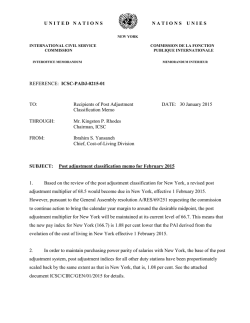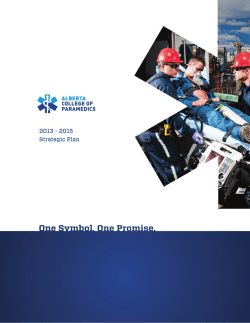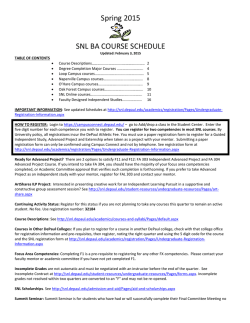
Indian Streams Research Journal
Vol 5 Issue 1 Feb 2015 ISSN No : 2230-7850 ORIGINAL ARTICLE International Multidisciplinary Research Journal Indian Streams Research Journal Executive Editor Ashok Yakkaldevi Editor-in-Chief H.N.Jagtap Welcome to ISRJ RNI MAHMUL/2011/38595 ISSN No.2230-7850 Indian Streams Research Journal is a multidisciplinary research journal, published monthly in English, Hindi & Marathi Language. All research papers submitted to the journal will be double - blind peer reviewed referred by members of the editorial board.Readers will include investigator in universities, research institutes government and industry with research interest in the general subjects. International Advisory Board Flávio de São Pedro Filho Federal University of Rondonia, Brazil Mohammad Hailat Dept. of Mathematical Sciences, University of South Carolina Aiken Hasan Baktir English Language and Literature Department, Kayseri Kamani Perera Regional Center For Strategic Studies, Sri Lanka Abdullah Sabbagh Engineering Studies, Sydney Ghayoor Abbas Chotana Dept of Chemistry, Lahore University of Management Sciences[PK] Janaki Sinnasamy Librarian, University of Malaya Ecaterina Patrascu Spiru Haret University, Bucharest Romona Mihaila Spiru Haret University, Romania Loredana Bosca Spiru Haret University, Romania Delia Serbescu Spiru Haret University, Bucharest, Romania Fabricio Moraes de Almeida Federal University of Rondonia, Brazil Anurag Misra DBS College, Kanpur Anna Maria Constantinovici AL. I. Cuza University, Romania Ilie Pintea, Spiru Haret University, Romania Xiaohua Yang PhD, USA George - Calin SERITAN Faculty of Philosophy and Socio-Political Sciences Al. I. Cuza University, Iasi ......More Titus PopPhD, Partium Christian University, Oradea,Romania Editorial Board Iresh Swami Pratap Vyamktrao Naikwade ASP College Devrukh,Ratnagiri,MS India Ex - VC. Solapur University, Solapur R. R. Patil Head Geology Department Solapur University,Solapur Rama Bhosale Prin. and Jt. Director Higher Education, Panvel Salve R. N. Department of Sociology, Shivaji University,Kolhapur Govind P. Shinde Bharati Vidyapeeth School of Distance Education Center, Navi Mumbai Chakane Sanjay Dnyaneshwar Arts, Science & Commerce College, Indapur, Pune Awadhesh Kumar Shirotriya Secretary,Play India Play,Meerut(U.P.) N.S. Dhaygude Ex. Prin. Dayanand College, Solapur Narendra Kadu Jt. Director Higher Education, Pune K. M. Bhandarkar Praful Patel College of Education, Gondia Sonal Singh Vikram University, Ujjain Rajendra Shendge Director, B.C.U.D. Solapur University, Solapur R. R. Yalikar Director Managment Institute, Solapur Umesh Rajderkar Head Humanities & Social Science YCMOU,Nashik S. R. Pandya Head Education Dept. Mumbai University, Mumbai Alka Darshan Shrivastava G. P. Patankar S. D. M. Degree College, Honavar, Karnataka Shaskiya Snatkottar Mahavidyalaya, Dhar Maj. S. Bakhtiar Choudhary Director,Hyderabad AP India. Rahul Shriram Sudke Devi Ahilya Vishwavidyalaya, Indore S.Parvathi Devi Ph.D.-University of Allahabad S.KANNAN Annamalai University,TN Sonal Singh, Vikram University, Ujjain Satish Kumar Kalhotra Maulana Azad National Urdu University Address:-Ashok Yakkaldevi 258/34, Raviwar Peth, Solapur - 413 005 Maharashtra, India Cell : 9595 359 435, Ph No: 02172372010 Email: [email protected] Website: www.isrj.org Indian Streams Research Journal ISSN 2230-7850 Impact Factor : 3.1560(UIF) Volume-5 | Issue-1 | Feb-2015 Available online at www.isrj.org A STUDY OF SOCIAL COMPETENCE RELATED TO ADJUSTMENT AND ACHIEVEMENT Sunilkumar B.Dodmani and D.H.Jagadeesh Abstract:-The transition from high school to college is marked by changes especially in social spheres of college students’ lives. The impact of college on the cognitive growth and the college as a setting for the socialization has shown marked changes in the social relationship of college students. Social competence is not just limited to happiness but has an important influence on adjustment, achievement it also influences the kind of social adjustment college adjustment, the adolescent makes that often compensates for unsocial or even antisocial behavior. Social competence influences the degree of success the person achieves in life. This study examined the relationship between social competence, adjustment, and achievement of (first year) preuniversity college students. The sample consisted of two Hundred and twenty five preuniversity college students selected from social competence related to personal adjustment, social adjustment, overall adjustment and achievement of pre-university college students of Gulbarga city. Tools for collecting the data included crates’ social competence scale has Measured by V.P.Sharma, adjustment inventory scale by A.K.P.Singha . The major findings were there are significant relation between social competence, adjustment, and achievement, and the two group’Viz., social competence in difference on the selected variables with the latter showing higher levels of social competence, adjustment, achievement. Keywords: social competence, adjustment, achievement. INTRODUCTION: Social competence is defined as the collection of specific social skills that permit individuals to perform successfully in social sitting (Erwin, 1995; and Philippot). Social competence means a facility in dealing with people and social situation. Social competence is one of the dominant elements in the personality pattern and behavior. It governs the individual’s reaction to people and situation and determines the quality of his to be personality and socially well adjusted. Ford (1985) offered five distinct uses of competence: as an outcome measure reflecting one’s effectiveness in a specific situation, the use of competence is similar to “resilience”, a term use to discuss children who successfully over come stressful life circumstances and continue to perform well in college (Garmazy and Masten, 1991), Competence as a composite of knowledge, skills and abilities that permit successful adaptation, and a belief in one’s effectiveness. Adjustment is a state of harmonious relation to the environment where in one is able to abstain satisfaction for most of one’s needs and to meet fairly well demands, physical and social, part upon one’s (English and English). One could distinguish between adjustment within one self (inter personal) and with others (interpersonal). School is more than a place where culture is transmitted and skills being taught. It is a world of varied human contacts that demands adjustment on the part of the child. it is a world where friendships are made and those who do not easily make friends feel isolated. They are not self-bound .particularly; minority and economically lees favored groups may feel lack of status and acceptance. Level of academic achievement during adolescence and educational attainment later is life is strong predictors of variety of indicators of well being in adulthood. A well adjusted adolescent meets his college environment with the initiative of full sharing with others and for the optimum development of himself and herself, Student’s perceptions of their teacher’s interest in their education also seen to have implications for their expected and as pried educational attainment. The shift between high school and college can be challenging and many changes occur in emotional, social and academic Sunilkumar B.Dodmani and D.H.Jagadeesh ,“ A STUDY OF SOCIAL COMPETENCE RELATED TO ADJUSTMENT AND ACHIEVEMENT” Indian Streams Research Journal | Volume 5 | Issue 1 | Feb 2015 | Online & Print 1 . A Study Of Social Competence Related To Adjustment And Achievement adjustment (Gerdes and Mallinck rodt, 1994). (Astin, 1984 and Tinto 1987, 1993) fist year students encounter obstacles which interfere with their involvement, integration and thus prevent them from taking full advantage of the college experiences. First year students face a number of problems in adjusting to university life. these include developing an appropriate identity and becoming socially integrating in to the college as well as attaining and learning generic skills and qualities such as critical thinking and intellectual rig our. Adjustment indicates the art of living of an individual. The psychology of adjustment focuses on practical matters understanding ourselves, understanding ourselves, understanding others, living in harmony with ourselves and with our neighbors” (Tallent.1978). Achievement has direct and indirect effect on personality. Directly the effect come how a person evaluates himself and indirectly, from his realization of how others evaluate him. Of the two the first one has greater effect on personality, because normally the person expects more about him than others expect of him and thus judges himself are harshly than other do (Hurlock, 1971). Achievement refers to bringing an effort to the desired end or the end gained. Since adjustment and achievement are two cardinal dimensions of a person’s behavior and since social competence is acceptably a significant influence of behavior, it was felt that a knowledge of the relationship between social competence and the other two variables would be very enriching and useful hence this study. SIGNIFICANCE OF THE STUDY: Social competence is the key stone of personality. Social competence also plays an important role in adjustment process by which we form impressions of others and has directly and indirectly effect on achievement directly the effect comes how a person evaluates himself and indirectly from his realization of how others evaluate him since adjustment and achievement two cardinal dimension of a person’s behavior and since social competence is acceptably a influence of behavior hence the relationship between social competence and other to variables would be very enriching and useful. OPERATIONAL DEFINITION OF THE TERM USED 1.Social competence: social competence is social ability and interpersonal skills to effectively deal with the various problematic situations. 2. Adjustment: Shaffer and shoben (1956) “the term adjustment is simply a process, involving both mental and behavioral responses by which an individual strives to cope with inner needs, inner demands and those imposed upon him by the external world”. 3. Achievement: the achievement variable emphasizes mastery of intellectual, athletic, mechanical and artistic skills as well as competence in specialized crafts (Mosss and Kagan, 1968). OBJECTIVES OF THE STUDY 1. To find out the correlation between social competence and adjustment. 2.To study the co-relation between social competence and achievement. 3.To study the some areas of social competence correlate more with social, adjustment than do other areas. 4.To study the some areas of social competence correlate more with achievement than do other areas. 5.To study the some areas of social competence correlate more with personal adjustment than do other areas. HYPOTHESIS OF THE STUDY 1.There is a significant co-relation between social competence and adjustment. 2.There is a significant co-relation between social competence and achievement. 3. There is a significant co-relation between social competence and status of the family. 4.There is a significant co-relation between social competence and personal, social overall adjustment. 5.The dependent variables are co-related significantly with each other. METHODOLOGY SAMPLE DESIGN In this Study investigation among the Pre-University College Students of the Gulbarga City, PreUniversity college students studying in the first year class. A sample of 200 hundred and twenty-five was selected in a Stratified random style to represent in various disciplines of the students. Indian Streams Research Journal | Volume 5 | Issue 1 | Feb 2015 2 . A Study Of Social Competence Related To Adjustment And Achievement TOOLS For the correlation of data the following tools used 1) social competence 2) adjustment Inventory. The social competence scale measured social competence in six areas, such as the Pro-social attitude, social competition, social leadership, social tolerance, Social maturity and team capabilities. And three dimensions of adjustment, namely, personal adjustment, social adjustment and overall adjustment, were measured by the adjustment Inventory, these instruments had been standardized in the relevant population. Examination Marks of the students were taken to indicate their academic achievement level. Thus scored on Social competence, adjustment and achievement were obtained. TABLE-CORRELATION AND CO-EFFICIENT S. Social competence variable Personal adjustment Social adjustment Overall adjustment achievement 01 Pro-social 0.06 0.17 * 0.13 0.03 02 Social competition 0.12 0.29** 0.25** 0.10 03 Social leadership 0.20** 0.30** 0.30** 0.01 04 Social tolerance 0.13 0.26** 0.24** 0.04 05 Social maturity 0.16* 0.15* 0.18* 0.06 06 Team capabilities 0.20** 0.14 0.19** 0.04 07 Total social competence 0.24** 0.27** 0.29** 0.01 no (* * = p < 0.01; * = p < 0.05) DATA ANALYSIS The collected data’s were analyzed in accordance with the hypothesis proposed for the study. Each hypothesis was analyzed separately. The data were analyzed with the help of Pearson’s product-moment correlation were computed for the total social competence score with overall adjustment and achievement scores. Correlations were also computed for six sub-social competence scores with personal adjustment score, social adjustment score, overall adjustment and achievement score. The analysis of the data has been done according to the purpose of the study and it is presented in table drawn from the raw data REFERENCE 1.Barchard,K.A.(2003).Does emotional intelligence assist in the prediction of the academic success? Educational and psychological measurement, 63(5).840.858 2.Elias.M.J.Gara.M.schuyler, T, Brandon Muller;L.R;and sayette,M.A.(1991).The promotion of social competence.; longitudinal study of a preventive school-based program. American journal of orthopsy chiatry 61 (3), 409-417. 3.Pool.C.R,(1997).U P with emotional health Educational leadership, 54(8).12-14. 4.Chen,Rubin,K.H;and sun,4.(1992).social reputation and peer relationships in Chinese and Canadian children; A cross-cultural study, Child development, 63, 133-1343. 5.Coie,J.P.Dodge,K.A;a kupersmidt,J.B.(1990).Peer group behauior and social stutus.in S.R.Asherd J.P.Coie (Eds), peer rejection in childhood (pp.17-59). New York; Cambridge university press. 6.Ogunkoa,B.J.January (2000):”A journal for educational research and development perspective in Education volume 16 no.1(Published) R. Govinda for the educational and development,46,Harrinagar,Baroda. 7.Ramnath Sharma, Rajendra Sharma. K. (2004): “Problems of education in India, New Delhi; Atlantic; Publishers and Distributors. 8.. . . Nauodaya Vidyalaya scheme.New Deilhi: N. V. Samiti. M.H. R. D.G. O. I. 1987. 9.Good and Hatt (1854) “Methods in Social Research” MC Graw- Hill book Company, New York. P 386. Indian Streams Research Journal | Volume 5 | Issue 1 | Feb 2015 3 Publish Research Article International Level Multidisciplinary Research Journal For All Subjects Dear Sir/Mam, We invite unpublished Research Paper,Summary of Research Project,Theses,Books and Book Review for publication,you will be pleased to know that our journals are Associated and Indexed,India ¬ International Scientific Journal Consortium ¬ OPEN J-GATE Associated and Indexed,USA ? Google Scholar ? EBSCO ? DOAJ ? Index Copernicus ? Publication Index ? Academic Journal Database ? Contemporary Research Index ? Academic Paper Databse ? Digital Journals Database ? Current Index to Scholarly Journals ? Elite Scientific Journal Archive ? Directory Of Academic Resources ? Scholar Journal Index ? Recent Science Index ? Scientific Resources Database ? Directory Of Research Journal Indexing Indian Streams Research Journal 258/34 Raviwar Peth Solapur-413005,Maharashtra Contact-9595359435 [email protected]/[email protected] Website : www.isrj.org
© Copyright 2026
